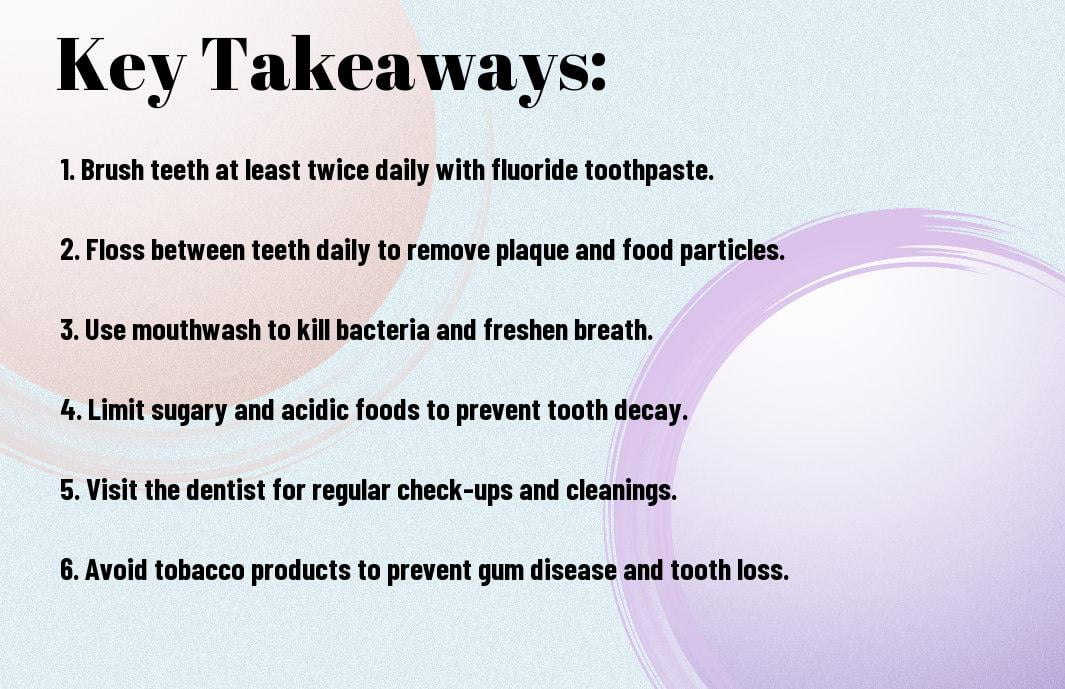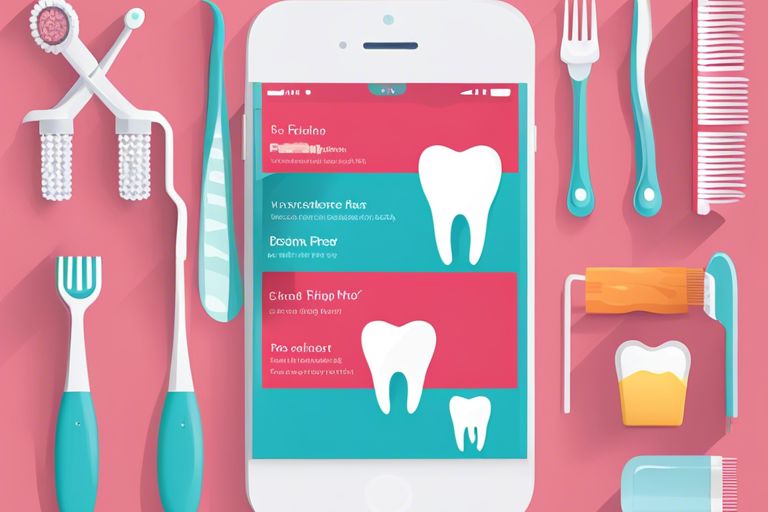Ensuring good oral hygiene is crucial for maintaining healthy teeth and gums. Neglecting your dental health can lead to a host of issues including cavities, gum disease, and even tooth loss. By following the right oral hygiene tips, you can keep your smile bright and your mouth healthy. In this blog post, we will provide you with essential tips and tricks to help you take care of your teeth and gums at home. From brushing techniques to proper flossing, mouthwash, and regular dental visits, these tips will ensure you maintain optimal oral health for years to come.
Key Takeaways:
- Consistent brushing and flossing: Maintaining a consistent routine of brushing and flossing is crucial for preventing plaque buildup and maintaining healthy teeth and gums.
- Regular dental check-ups: Visiting the dentist for regular check-ups and cleanings is essential for identifying and addressing any issues before they progress.
- Proper technique: Using the proper brushing and flossing technique is important for effectively removing plaque and preventing tooth and gum problems.
- Healthy diet: Consuming a balanced diet that is low in sugar and high in nutrients can help promote oral health and prevent decay and gum disease.
- Avoiding tobacco products: Tobacco use can have a detrimental effect on oral health, leading to issues such as gum disease and oral cancer.
Daily Oral Hygiene Techniques
Assuming you want to maintain healthy teeth and gums, it’s important to have a solid daily oral hygiene routine. By following these simple techniques, you can ensure that your mouth stays clean and healthy.
Brushing Fundamentals
When it comes to brushing your teeth, make sure you are using a soft-bristled toothbrush and fluoride toothpaste. Brush your teeth at least twice a day, spending at least two minutes each time. It’s important to use gentle, circular motions to clean the front, back, and top of each tooth. Don’t forget to brush your tongue and the roof of your mouth as well, to remove bacteria and freshen your breath.
The Art of Flossing
Flossing is an essential part of your oral hygiene routine, as it helps to remove food particles and plaque from between your teeth where your toothbrush can’t reach. To floss effectively, use about 18 inches of floss and gently guide it between each tooth, curving it into a ‘C’ shape and rubbing it up and down against the side of each tooth.
Mouthwash: Pros and Cons
Mouthwash can be a helpful addition to your oral hygiene routine, but it’s important to understand both the pros and cons. Pros: Mouthwash can help to kill bacteria and freshen your breath. It can also reach areas that your toothbrush and floss can’t. Cons: Some mouthwashes contain alcohol, which can dry out your mouth and lead to bad breath. Additionally, some mouthwashes contain high levels of fluoride, which can be harmful if ingested in large amounts.
Cleaning the Tongue
Cleaning your tongue is an often-overlooked step in oral hygiene, but it’s crucial for maintaining fresh breath and overall oral health. Use a tongue scraper or your toothbrush to gently clean the surface of your tongue, removing bacteria and debris that can contribute to bad breath. Make sure to clean the entire surface of your tongue, from the back to the tip, and rinse thoroughly when you’re finished.
Diet and Oral Health
Now, let’s discuss the impact of your diet on your oral health. What you eat and drink can have a significant effect on the health of your teeth and gums. By making smart choices and avoiding certain foods, you can help maintain a healthy smile.
Foods to Embrace
When it comes to your oral health, there are several foods that you should embrace. Foods rich in calcium, such as dairy products, are essential for strong teeth and bones. Additionally, crunchy fruits and vegetables, like apples and carrots, can help clean your teeth and stimulate saliva production, which aids in neutralizing acids in your mouth.
Foods to Avoid
On the flip side, there are certain foods that you should avoid for the sake of your oral health. Sugary treats and beverages, such as candy, soda, and fruit juices, can contribute to tooth decay and erosion. Additionally, acidic foods and drinks, like citrus fruits and vinegar-based dressings, can wear down your tooth enamel over time, leading to increased sensitivity and a higher risk of cavities.
Professional Dental Care
Not all oral hygiene can be taken care of at home, which is why professional dental care is essential for the health of your teeth and gums. Your dentist plays a crucial role in maintaining your oral health and preventing issues from developing or worsening.
Regular Check-Ups
Visiting your dentist for regular check-ups is essential for maintaining your oral health. During these visits, your dentist will thoroughly examine your teeth and gums, looking for any signs of decay, gum disease, or other issues. Catching these problems early can prevent them from progressing and causing more significant damage to your oral health. Your dentist will also conduct a professional cleaning to remove any plaque and tartar buildup that you may have missed during your regular oral hygiene routine. Additionally, they may take x-rays to check for any underlying issues that may not be visible during a visual examination.
Dental Cleanings and Other Procedures
In addition to regular check-ups, dental cleanings and other procedures are an essential part of professional dental care. Professional cleanings help remove plaque and tartar buildup, which can lead to tooth decay and gum disease if left untreated. Your dentist may also perform other procedures, such as fluoride treatments, sealants, or cavity fillings, to maintain the health of your teeth and prevent future issues. They can also provide personalized advice for your oral hygiene routine and recommend specific treatments or products to address any concerns you may have about your oral health.
Troubleshooting Common Oral Health Issues
To maintain healthy teeth and gums, you need to be vigilant about common oral health problems. By identifying and addressing these issues early on, you can prevent more serious complications.
Preventing and Addressing Tooth Decay
Tooth decay is a common problem caused by plaque build-up on your teeth. This can lead to cavities and, if left untreated, more serious dental problems. To prevent tooth decay, it’s important to maintain a regular oral hygiene routine, including brushing twice a day, flossing daily, and visiting your dentist for regular check-ups. Additionally, 7 Tips for Healthy Teeth and Gums – Grandville can provide valuable insights on maintaining proper oral hygiene to prevent tooth decay.
Managing Gum Disease
Gum disease, also known as periodontal disease, is a serious condition that can lead to tooth loss if left untreated. Symptoms include swollen, red, or bleeding gums, and it’s caused by bacteria in plaque. To manage gum disease, you should practice good oral hygiene, including regular brushing and flossing, and visit your dentist for professional cleanings. Addressing gum disease early on is crucial to prevent irreversible damage to your gums and teeth.
Tackling Bad Breath
Bad breath, or halitosis, can be embarrassing and may indicate poor oral hygiene or an underlying health issue. To tackle bad breath, it’s essential to maintain a good oral hygiene routine, including brushing your teeth, tongue, and gums, and flossing regularly. Additionally, staying well-hydrated and avoiding foods that can contribute to bad breath can help keep your breath fresh. If you’re concerned about persistent bad breath, it’s important to consult with your dentist to rule out any underlying dental issues or medical conditions.
Advanced Oral Hygiene Tips
Your oral hygiene routine may need to evolve as you age. Here are some advanced oral hygiene tips to help you maintain healthy teeth and gums:
- What can adults do to maintain good oral health?: The Centers for Disease Control and Prevention offer valuable tips for adults to maintain good oral health. For more information, you can visit their website.
- Be diligent about your oral hygiene routine. Brush your teeth at least twice a day with fluoride toothpaste and floss daily to remove plaque and food particles.
- Consider using an antibacterial mouthwash to help reduce plaque and prevent gum disease.
- See your dentist regularly for professional cleanings and check-ups. This can help catch any potential issues early and prevent serious problems.
Latest Dental Hygiene Products
There are always new dental hygiene products hitting the market, aiming to improve oral health. From advanced toothbrushes to high-tech flossers, the options are endless. Make sure to do your research and choose products that are backed by science and have proven effectiveness in improving oral hygiene.
Technological Advances in Dental Care
Dental care has seen remarkable technological advances in recent years. From digital x-rays to laser dentistry, these advancements have made dental procedures more precise, efficient, and comfortable. New technologies can detect oral health issues early and provide less invasive treatment options, ultimately leading to better outcomes for your oral health.
The Importance of Maintaining Healthy Oral Hygiene
The key to maintaining healthy teeth and gums lies in following a solid oral hygiene routine. By brushing your teeth twice a day with a fluoride toothpaste, flossing daily, and visiting your dentist regularly, you can prevent plaque buildup, cavities, and gum disease. It’s also important to limit sugary and acidic foods and drinks, and to avoid smoking, as these habits can have a detrimental effect on your oral health. Additionally, be mindful of the way you brush – using gentle, circular motions is more effective than harsh scrubbing. By making these simple but effective changes to your oral hygiene routine, you can ensure the health and longevity of your teeth and gums for years to come.
Oral Hygiene Tips for Maintaining Healthy Teeth and Gums
Q: Why is oral hygiene important for maintaining healthy teeth and gums?
A: Oral hygiene is crucial for preventing cavities, gum disease, and other oral health issues. Proper brushing and flossing remove food particles and plaque, which can lead to tooth decay and gum inflammation. Regular dental check-ups also help in detecting and addressing any potential problems early on, ensuring the overall health of your teeth and gums.
Q: How often should I brush and floss my teeth?
A: It is recommended to brush your teeth at least twice a day, in the morning and before bed. Using fluoride toothpaste and a soft-bristled toothbrush, brush for at least two minutes to thoroughly clean all surfaces of your teeth. Flossing should be done at least once a day to remove plaque and food particles from between the teeth and below the gumline. Additionally, consider using an antiseptic mouthwash to further reduce plaque and gingivitis.
Q: What are some additional tips for maintaining healthy teeth and gums?
A: Apart from regular brushing, flossing, and dental check-ups, there are several other oral hygiene tips to keep in mind. Limiting sugary and acidic foods and drinks, avoiding tobacco products, and staying hydrated with water can all contribute to better oral health. Chewing sugar-free gum after meals can also help by increasing saliva production, which neutralizes acids and helps wash away food particles. Additionally, using a tongue scraper to clean the surface of your tongue can help reduce bad breath and bacteria in the mouth. Lastly, wearing a mouthguard during sports and addressing teeth grinding (bruxism) can help protect your teeth from damage. Incorporating these practices into your daily routine will help maintain healthy teeth and gums for years to come.







